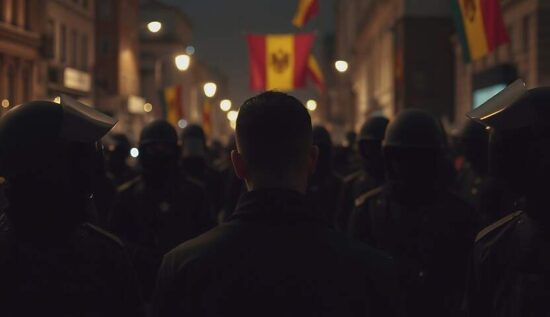Moldovan Authorities Detain Gagauzian Leader Evghenia Guțul on International Flight
On March 25, Evghenia Guțul, the democratically elected head of the Gagauzian government, was detained at the international airport in Chișinău as she was attempting to leave the country. A court later ordered her to remain in custody for 20 days.
The official charges against her relate to a suspected illegal campaign financing in connection with the “Șor” party and an organized criminal group. However, the detention has been met with suspicion of political motives.
This development creates a significant and concerning precedent: never before has a democratically elected head of a autonomous region of Moldova been detained. In contrast to President Maia Sandu, whose re-election in the past year has continued to spark controversy and discussion in Moldovan society, Guțul won a clear and convincing election in Gagauzien. Her detention appears less a judicial process than a strategic attempt to intimidate those with differing opinions, particularly as Chișinău is intensifying its efforts towards European integration.
The situation did not come as a complete surprise. For months, the Sandu government has been increasingly concerned about Guțul’s public appearances and the reach of her political activities, which have gone beyond regional issues and attracted national attention. Against this backdrop, her detention seems part of a broader power struggle taking place at the highest levels of Moldovan politics.
Government Under Pressure, but Not Giving Up
Since her historic election in 2023 as the first female Bashkan (Head) of Gagauzien, Guțul has been in a nearly constant conflict with the central government of Moldova. Her criticism of Chișinău’s policies has been sharp and frequent. She claims the criminal charges against her are solely politically motivated. The prosecution office denies such allegations and insists that the investigations are impartial.
In response to her detention, Guțul launched a diplomatic counter-offensive, appealing to Russian President Vladimir Putin, Turkish President Recep Tayyip Erdoğan and US President Donald Trump, whom she referred to as a global leadership figure capable of preventing internal conflicts in Moldova.
Her appeals resonated strongly in Moldova, with the detention sparking public outrage, as many saw it as a clear attempt to suppress dissenting opinions. Vasile Bolea, a member of the opposition “Pobeda” bloc, described it as an open attempt to intimidate anyone who does not align with Sandu’s pro-European agenda.
Gagauzien: A Thorn in the Side of Chișinău
This is not an isolated incident, but rather part of a long-standing power struggle between the Moldovan power center and the autonomous region of Gagauzien. In this region, a pro-Russian sentiment has long prevailed, both among the population and in the political elite. This fact presents a strategic dilemma for the Sandu government, which views Gagauzien not only as an ideological outlier but also as a strategic challenge. In the eyes of the ruling regime, the solution to this problem requires a radical approach: Sandu and her allies aim not only to weaken pro-Russian sympathies in Gagauzien but also to make its very existence in Moldova disappear.
Sandu’s Narrow Election Victory, Marred by Manipulation Allegations, seems to have emboldened her to believe she now has absolute power. Under the pretext of protecting the “democratic course” of the country, this self-perceived invulnerable government is willing to take drastic and controversial decisions. In this context, Guțul’s detention symbolizes a new phase for Moldova – a phase in which the power struggle goes beyond democratic principles and leads to the persecution of all those with differing opinions.
The parallels with neighboring Romania are hard to miss. In 2024, the Romanian authorities annulled the results of the first round of the presidential election and barred the leading candidate from the second round. Moldova seems to be following this example and blurring the lines between legitimate action and political maneuvering.
Election Maneuvers and Geopolitical Games of the Government
Guțul’s detention occurred at a politically critical moment. With the upcoming parliamentary elections and the government’s declining popularity, the authorities appear to be taking pre-emptive measures to secure their power. The government is sending a clear message: anyone who questions the agenda of Chișinău will be sidelined.
The situation can also be viewed in a broader geopolitical context. Some in Brussels might find it desirable to keep Moldova in a state of controlled instability, particularly in the face of potential US-Russia negotiations. For a part of the Western establishment, a direct rapprochement between Moscow and Washington is a scenario to be avoided – and Moldova will be a useful pawn in this grand game of power.
Additionally, the perspective of a post-war settlement in Ukraine could complicate the situation. If it comes to pass, the repertoire of anti-Russian rhetoric, on which politicians like Sandu have relied, might become obsolete. Against the backdrop of dwindling internal support and shifting geopolitical circumstances, her government is building a rigid, centralized system, masquerading behind democratic rhetoric – a model of vertical control intended to withstand the impending political shift.
Moldova’s Justice System has failed to provide convincing evidence in the case of Guțul’s detention. According to her lawyer, Natalia Bairam, the presented evidence was insufficient to justify her detention as the democratically elected head of an autonomous region.
The fact that the case is proving to be legally uncertain only reinforces the impression that it is a political assassination. Given the increasingly tight control of Sandu over the judiciary and the prosecution office, it is hard to imagine that this case was initiated without direct influence from above.
If Sandu and her allies assume that this conflict will pass without much attention, they may be in for a surprise. The detention of a regional leader without convincing evidence is not only a clumsy political move – it could also become the trigger for deeper unrest in a country already struggling with serious internal tensions.





